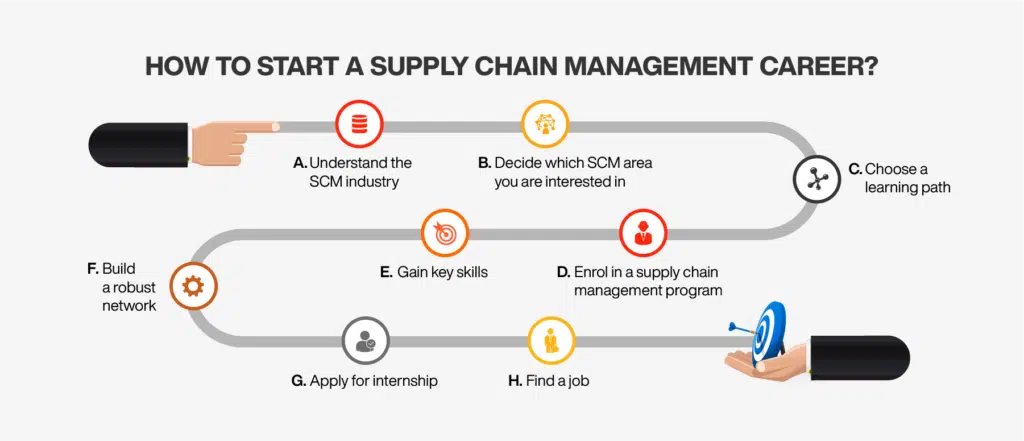Why Supply Chain Management is important in an E-commerce environment?
Table of Contents

- jaro education
- 26, August 2023
- 4:00 pm
Delivering goods from the supplier to the store is the prime focus of supply chain management. It has become a complicated process with numerous participants and interactions. Consumers in e-commerce demand short processing times, continuous monitoring, and simple refunds. Business supply chain management procedures must be adequate to achieve these objectives.
The pandemic has shown us the importance of supply chain management. Delays in product production and delivery have resulted from the breakdown of global supply systems. Organisations have thus realised the vitality of inventory optimisation and reliable supply chain management techniques in surviving challenging times.
An excellent chance for individuals to gain the knowledge and abilities needed to improve their supply chain data strategy is the IIM Nagpur Post Graduate Certificate Programme in Supply Chain Operations & Analytics. This supply chain operations and leadership programme offer a path for professional progress. Participants can comprehend the complexity of operations and analytics with the help of resources and a comprehensive approach.
Different Components of E-Commerce Supply Chain Management
The administration of numerous operations involved in moving goods and services from suppliers to customers in an online business environment is referred to as “e-commerce supply chain management.” To ensure effective product movement, prompt delivery, and satisfied customers, it comprises the integration of processes, systems, and technology. Four major categories can be used to group the components of supply chain management for online retailers:
Strategy
A structured strategy must be established before establishing an E-Commerce business. To do this, one must undertake demand forecasting to estimate product quantities, set budgets, compile a list of suppliers, assess their prices and those of shipping partners, set delivery deadlines, decide on payment terms, and create cost and revenue plans. Before starting your firm, create a thorough business plan to ensure the organisation’s consistency.
Source of the commodity
The next step is finding the resources you need to develop your inventory after you have an extensive strategy in hand. This involves developing a network of trustworthy suppliers offering low-cost, premium raw materials. The goal is to find items that satisfy customers to the fullest extent and meet their expectations.
Inventory Management
It involves monitoring and controlling the levels of stock at various stages of the supply chain, including raw materials, work-in-progress, and finished goods. E-commerce companies utilise inventory management systems and technologies to track inventory levels, forecast demand, and optimise stock replenishment.
Logistics
Effective logistics operations are essential in e-commerce to guarantee on-time delivery and consumer satisfaction. This covers last-mile delivery, warehousing, and transportation management. To manage transportation and warehousing tasks, e-commerce enterprises frequently collaborate with logistics service providers. They might use various shipping methods, including package delivery services, freight forwarders, or even their own delivery fleet. To improve logistics efficiency, cutting-edge technology, including route optimisation, real-time tracking, and delivery management software are used.
To manage these components, e-commerce businesses employ a range of digital technologies and systems. These may include enterprise resource planning systems, customer relationship management software, inventory management software, order management systems, and transportation management systems. These tools help in the automation and integration of various processes, data sharing, and improved visibility across the supply chain.

How is Supply Chain Management important in E-Commerce?
To surpass client expectations and keep up with the competition, e-commerce businesses must practise efficient supply chain management. Organisations have to fully understand the steps in their supply chain and make efficient use of technology. Strong supply chain management is crucial for the success of any e-commerce company. Some explanations are highlighted below:
Maintaining inventory
Inventory control is a crucial component of supply chain management. E-commerce companies need to carefully manage their inventory to make sure they have enough goods on hand to meet client demand without overstocking. Through efficient inventory management, businesses may strike a balance between keeping just the right amount of goods on hand to satisfy customer demand and avoiding retaining stocks unnecessarily.
Providing quick delivery
When customers shop online, they want their purchases to be delivered quickly and effectively. Customers want their orders to arrive within a few days of placing them. If an online store doesn’t meet their expectations, they’ll probably switch to a rival. Customer satisfaction and repeat business are assured by an efficient supply chain that ensures timely product delivery.
Cost-cutting
Supply chain management can help e-commerce businesses reduce costs. By optimising their supply chains, businesses can minimise the costs of production, shipping, and raw materials, ultimately lowering consumer pricing. As a result, companies can surpass their competitors.
Raising effectiveness
Resilient supply chain management can help e-commerce businesses become more effective. Businesses may shorten lead times, cut waste, and raise quality by optimising the production and delivery process. This way, businesses can increase consumer satisfaction and loyalty by promptly adapting to demand changes.
Better consumer experience
The success of any e-commerce firm depends heavily on the quality of the customer experience. A successful supply chain management strategy can help organisations improve the customer experience by ensuring that products are delivered on time and in good condition. Positive reviews and suggestions may come, as a result, aiding businesses in acquiring new customers and retaining existing ones.
Visibility for Risk Management
Small e-commerce organisations can develop agility and resilience and get a complete picture of their whole supply chain network by setting up an efficient supply chain management system. This improved visibility allows a thorough analysis of both the overall picture and the intricate micro-aspects of the supply chain. Businesses may foresee and proactively reduce possible dangers with this level of attention to detail. They can protect their revenue with more operational control, including backup suppliers, vendors, and methods for reducing risk. To prevent major income losses during difficult times, it is prudent for internet firms to set up emergency funds.
The Function of Supply Chain Management in Online Shopping
- A well-managed supply chain enables e-commerce companies to procure goods and raw materials from trusted suppliers. With a globalised supply chain, these businesses can offer customers various products from different regions.
- Businesses can minimise the risk of shortages and guarantee that products are available when customers need them by employing effective inventory management procedures.
- Companies may optimise the order processing workflow with good supply chain management, ensuring that orders are processed accurately and promptly, allowing customers to receive their items on schedule.
- These companies can maximise storage capacity, cut storage expenses, and guarantee the safe and secure storage of their products by putting in place reliable warehouse management solutions.
- An essential component of e-commerce operations is fast and successful product delivery. By improving shipping routes, reducing delivery times, and preserving product quality during transportation, businesses can guarantee customer satisfaction.
Conclusion
Businesses must keep up with the most recent developments to stay competitive as the e-commerce and supply chain sectors undergo rapid change. The top trends in e-commerce and supply chain management include the rise of Artificial Intelligence (AI) to improve operations and customer experience, adopting omnichannel strategies for easy shopping experiences, automated fulfilment using machines and robots, and personalised customer experiences. These trends shape the future of e-commerce and supply chain management, and businesses should consider incorporating them to stay ahead of their competitors.
IIM Nagpur offers a multidisciplinary programme for those looking to succeed in the manufacturing, services, or logistics industries. It is called the Post Graduate Certificate Programme in Supply Chain Operations & Analytics. Through Jaro Education, aspirants can apply for this programme. It serves both seasoned professionals and those just starting their careers by being a concrete help that improves their knowledge and abilities in supply chain operations and analytics.











